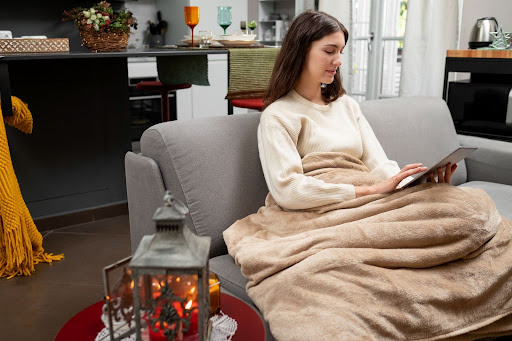Sleep Better Tonight - Relaxation Techniques To Calm An Anxious Mind

Strong 8k brings an ultra-HD IPTV experience to your living room and your pocket.
Calm your racing thoughts and soothe your worried mind with effective relaxation techniques that can help you get a restful night's sleep. In today's fast-paced world, anxiety and stress can often keep us tossing and turning at night, impacting our overall well-being. By incorporating simple yet powerful relaxation methods into your bedtime routine, you can promote a sense of calm and tranquility that will guide you towards a peaceful night's rest. Discover how to unwind, quiet your mind, and prepare your body for a rejuvenating sleep experience with these proven techniques.
Key Takeaways:
- Practice deep breathing: Deep breathing exercises can help calm an anxious mind and prepare the body for sleep.
- Guided imagery: Engaging in guided imagery can distract the mind from anxious thoughts and promote relaxation before bedtime.
- Mindfulness meditation: Practicing mindfulness meditation can help foster a sense of calm and presence, making it easier to fall asleep and stay asleep throughout the night.
Preparing Your Sleep Environment
Optimizing Your Bedroom for Sleep
For optimal sleep quality, your bedroom should be a sanctuary dedicated to rest and relaxation. Keep the room cool, quiet, and dark to promote quality sleep. Invest in a comfortable mattress and pillows, and choose calming colors and decor to create a peaceful atmosphere. Make sure your bedroom is well-ventilated and free of clutter to reduce distractions and promote a sense of calmness.
The Role of Electronics and Light
One of the biggest obstacles to a good night's sleep is excessive exposure to electronics and artificial light. The blue light emitted by screens can disrupt your body's natural sleep-wake cycle, making it harder to fall asleep. Prioritize a technology-free zone in your bedroom by avoiding screen time at least an hour before bed. Consider using blackout curtains to block out external light sources and create a dark sleep environment that signals to your body it's time to rest.
Sleep Better Tonight - Relaxation Techniques To Calm An Anxious Mind
Relaxation Techniques for Better Sleep
Breathing Exercises for Relaxation
One effective way to calm an anxious mind and improve sleep quality is through deep breathing exercises. By focusing on slow, deep breaths, you can activate the body's relaxation response, reducing tension and promoting a sense of calmness. Techniques such as diaphragmatic breathing or 4-7-8 breathing can help soothe the mind and prepare it for restful sleep.
Progressive Muscle Relaxation
Relaxation can be achieved by systematically tensing and relaxing different muscle groups in the body. Progressive Muscle Relaxation (PMR) helps release physical tension and signals to the body that it is time to unwind. By engaging in a series of muscle contractions and releases, you can train your body to recognize the state of relaxation, making it easier to let go of stress and anxiety before bedtime.
Progressive Muscle Relaxation involves tensing each muscle group for a few seconds before releasing the tension, allowing you to experience the contrast between tension and relaxation. This mindfulness of the body's sensations can help increase awareness of where you hold stress and how to actively release it, promoting a deeper sense of relaxation and a more peaceful night's sleep.
Mindfulness and Meditation
Mindfulness Practices to Ease into Sleep
For a restful night's sleep, incorporating mindfulness practices can be highly beneficial. Begin by focusing on your breath, taking slow and deep breaths to calm the mind and body. Engage in a body scan, starting from your toes and working your way up, gradually releasing tension in each part of your body. This practice can help alleviate anxiety and promote a sense of relaxation, making it easier to drift off to sleep.
Guided Meditation for Sleep Improvement
Improvement in sleep quality can be achieved through guided meditation. By listening to a soothing voice guiding you through relaxation techniques, you can create a peaceful and tranquil environment conducive to sleep. Guided meditations often focus on releasing stress and promoting positive thinking, helping you let go of worries and unwind before bedtime.
Practices like mindfulness and guided meditation can play a significant role in calming an anxious mind and improving sleep. These techniques are powerful tools that can be incorporated into a bedtime routine to create a sense of calm and relaxation, ultimately leading to a more restful and rejuvenating sleep.
Creating a Nighttime Routine
Rituals to Signal Your Body It’s Time for Sleep
All effective nighttime routines start with rituals that signal to your body that it’s time to wind down and prepare for sleep. These rituals can include activities like taking a warm bath, reading a book, or practicing relaxation techniques such as deep breathing exercises. By consistently engaging in these calming activities before bed, you can train your body to recognize these signals and naturally start transitioning into a state of relaxation.
The Power of Consistency and Sleep Hygiene
Your nighttime routine should include consistency and good sleep hygiene practices. Going to bed and waking up at the same time every day helps regulate your body’s internal clock, making it easier to fall asleep and wake up feeling refreshed. Establish a bedtime routine that promotes relaxation and avoids stimulating activities like using electronic devices or consuming caffeine close to bedtime. Maintaining a comfortable sleep environment with a cool, dark, and quiet room can also significantly improve the quality of your sleep.
Body: Consistency and sleep hygiene are crucial for setting the stage for a restful night’s sleep. By following a regular bedtime routine and creating a peaceful sleep environment, you can train your body to relax and signal the brain that it’s time for rest. Implementing these practices consistently can lead to improved sleep quality and overall well-being.
Summing up
Hence, mastering relaxation techniques can significantly calm an anxious mind and improve the quality of your sleep. By incorporating mindfulness, deep breathing, progressive muscle relaxation, and visualization, you can create a soothing bedtime routine that helps alleviate anxiety and promote relaxation. Remember to be consistent with these practices to experience the full benefits and enjoy a restful night's sleep.
FAQ
Q: What are relaxation techniques for calming an anxious mind?
A: Some relaxation techniques for calming an anxious mind include deep breathing exercises, progressive muscle relaxation, guided imagery, meditation, and aromatherapy.
Q: How can deep breathing help improve sleep quality?
A: Deep breathing activates the body's relaxation response, reducing stress and anxiety levels which can help improve sleep quality by promoting relaxation and calming the mind.
Q: Is it important to establish a bedtime routine for better sleep?
A: Yes, establishing a bedtime routine can signal to your body that it is time to wind down and prepare for sleep. Consistent bedtime routines can help improve sleep quality and reduce insomnia symptoms.
Note: IndiBlogHub features both user-submitted and editorial content. We do not verify third-party contributions. Read our Disclaimer and Privacy Policyfor details.








